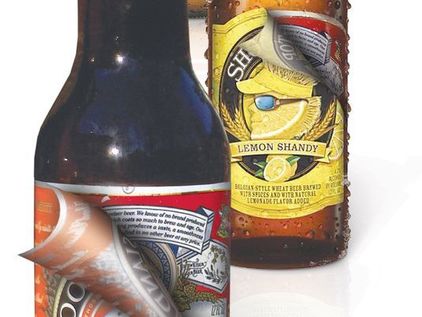 by Mark E. Lasbury for Indiana On Tap
by Mark E. Lasbury for Indiana On Tap
AB-InBev is acquiring Wicked Weed. That bit of information almost broke the craft beer channels of the internet Wednesday, but the trend started long before then and will continue long into the future, unless there is a concerted effort on the part of craft beer brewers and drinkers. I don’t know much about business, but here is an opinion, a fact, and a question that keeps hurting my brain.
Number one, I realize that it’s hard to turn down money that will change the fate of your family for generations. No craft beer brewer opens a brewery, works that hard, learns to conduct business and build a brand just so that they can scrape by or lose money. Brewers are in business to make money. And when silly money from big beer gets offered to you for your hard work, the decision can’t be easy.
That’s my opinion, carved out by years of working hard, making less money than I think I am worth, and praising my wife Walter for having a good job that she is willing to go to everyday. But here’s another opinion, backed up by more than my feelings – big beer is bad for craft beer. Walt and Luke Dickinson of Wicked Weed said yesterday that we are all getting it wrong, that their acquisition by AB-InBev is a good thing for fans of the beer they make and that other brewers make.

The actions of AB-InBev in recent history tells us that this is not true. Wicked Weed is their first acquisition of 2017, but in recent years they have bought outright or acquired a controlling interest in Goose Island, Blue Point, Elysian, Breckenridge, 10 Barrel, Devil’s Backbone, Golden Road, and Fore Peaks. Other big beer companies have acquired similar craft beer producers (as word comes out on 05/04 that Lagunitas has sold their remaining 50% stake to Heineken), but let’s focus here on the recent buyout and the other breweriess acquired by AB-InBev.
The fact is that big beer does harm craft beer. Money is at the heart of it all, and macro beer has a lot of it. Their agenda has been written about in many articles, but basically, it boils down to three points: 1) if you can’t beat’em, buy’em and make money off of them; 2) use big beer money to undercut beer prices to the point where independent brewers lose money and eventually close; and, 3) control the shelf space in stores and taps in restaurants by buying distributors and having enough leverage to influence the actions of other distributors. This third point is the most devious and can do the most damage.
That leads to the question I keep asking myself – if acquisitions are bad for craft beer, why do they keep happening? There is such a wonderful community of craft brewers in America, and they listen to, learn from, and care for one another. That was apparent from the heartfelt and obviously difficult open letter that Jester King Brewing wrote yesterday to address the Wicked Weed situation. Yet I do not think that the majority of craft beer brewers and drinkers are bringing as much pressure to bear as they could.

Take, for instance, the Wicked Weed Funkatorium Invitational that will take place on July 8 in Asheville. Seventy breweries, all big names, had committed to pour at the event before the announcement yesterday. It is safe to say that Wicked Weed didn’t give them a heads up, considering participant Jester King’s letter. They, and seven other breweries pulled out of the festival in the last 24 hours (Black Project, Grimm Artisanal Ales, Jackie O’s, OEC Brewing, Wooden Robot, Haw River, and Trillium). These breweries are flexing the muscle that they have. (Note: the list of breweries that have reversed themselves on serving at the Invitational had reached 26 by late Thursday)
Why would a craft brewer support a brewery, directly or indirectly, when that brewery is part of a group that actively works against the interests of smaller, independent craft beer? Jester King collaborated often with Wicked Weed, and they sold Wicked Weed beer in their taproom. That’s all gone now and that makes a direct impact on Wicked Weed’s bottom line. But Jester King also had good will with the Asheville brewery and poured at Wicked Weed festivals. Removing that has an indirect effect but is just as important. If more breweries and drinkers withheld financial support and goodwill from breweries that sell out to big beer, I think that the additive effect would start to make a difference.

To this end, I am wondering what will happen with the other 62-63 breweries scheduled to pour at the Invitational. I can understand why Goose Island and 10 Barrel have no problem showing up, but I am more concerned with what some of my favorite breweries are going to do. Upland Brewing – are you planning on attending the Invitational. If yes, why? If no – tell us and make it loud and public. The same should go for my other favorites (almost all of them on the list) – Brewery Vivant, Scratch Brewing, Tröegs Independent Brewing, Jolly Pumpkin, and New Holland.
Vivant and Scratch are small enough to be offended by Wicked Weed’s move on an emotional as well as financial level, while New Holland and Boulevard are big enough to be greatly affected by the distributor influencing of big beer. Upland Brewing is in between, small enough to be pure of heart, but also starting to distribute in Boston, New York, Washington DC, and other places. For them, shelf space and taps are now much more important than they were just a few short months ago.
What I am requesting is that these breweries, and others, use the power they have, both direct and indirect, to bring pressure on the industry to remain independent. Craft beer bars, are you forced to carry Wicked Weed beers and those from other breweries that sell out to big beer? Craft beer drinkers, I’m talking to you as well. You speak with your drinking dollars – why would you give your money to a group that is actively harming that which you love? I think it is time to flex the muscles that we have as producers, suppliers, pourers, and consumers.
Beaker’s Suggestion: Breweries and Craft Beer bars could post a list of breweries that have sold out to big beer, just as a public service reminder to their patrons. They may sell beer from those breweries, but the customer should be informed. (Note: reader Dave Ehlman suggests an app called Craft Check to keep track of which breweries are BA-defined craft; ie. who owns whom.)
